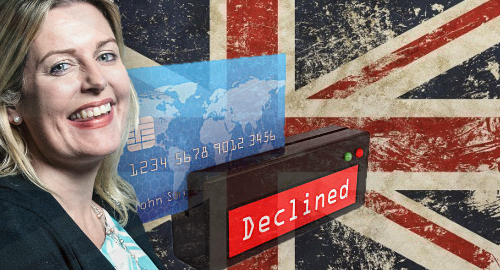 The UK government is mulling whether to restrict its citizens’ capacity to use their credit cards for gambling purposes, according to a new Tory minister.
The UK government is mulling whether to restrict its citizens’ capacity to use their credit cards for gambling purposes, according to a new Tory minister.
This week, Mims Davies, the Tory MP for Eastleigh and the recently appointed Minister for Sport and Civil Society, gave a speech at the industry-funded charity GambleAware’s sixth annual ‘harm-minimization’ conference in London.
Davies (pictured) said her appointment followed “an extremely progressive year of policy developments” but warned that “the publication of the Gambling Review did not mark the end of government action.”
Davies said the government supported the gambling industry’s employment and investment, but “there are risks and industry must mitigate those risks with appropriate protections.” Davies emphasized the need for gambling operators “to deliver early interventions, before harm occurs,” adding that she wants to see “rapid progress in this area.”
As an example, Davies said there were “increasing concerns around people gambling on credit cards and whether this should be permitted. This is an area we are already looking into in detail to understand the full situation and to consider if action in this space is needed.”
Davies also warned that, while the recent increase in GambleAware’s voluntary funding from industry was encouraging, the government wasn’t ruling out a shift to “other ways of funding support, including a mandatory levy” if this voluntary system came up short again. “The profits of gambling operators aren’t my prime concern. Ensuring problem gamblers have access to the right treatment is.”
Last month saw Davies replace former sports minister Tracey Crouch, who quit over a perceived delay in the government’s plan to cut the maximum stakes on fixed-odds betting terminals. The government has since agreed to impose that stake cut by April 1, 2019, and to bring forward the planned hike in Remote Gaming Duty.
The Tory government is on its back heels on the gambling brief, and any minister that isn’t seeking an immediate return to the back benches would do well to rap some gambling operator knuckles to keep the anti-gambling media on board.
In her speech, Davies said that accurate research is “essential to progress” on reducing gambling-related harm. Davies said she wanted to see “a strong evidence base” and praised Public Health England for committing to an evidence review.
With any luck, Davies’ commitment to evidence-based policies will take into account that the UK’s problem gambling rates have remained steadfastly constant over the years despite the increase in gambling availability and the hyperbolic claims of the likes of the Daily Mail.